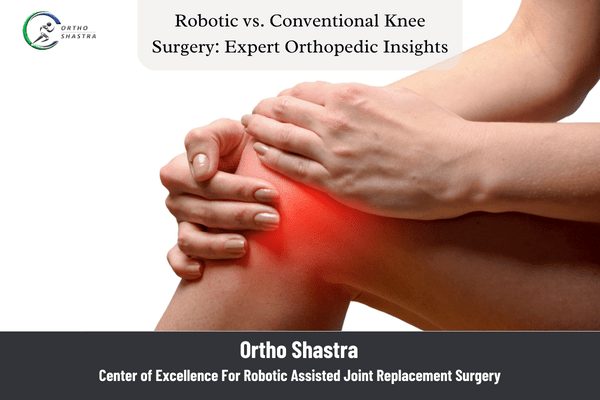In the realm of knee replacement surgery, advancements in technology have revolutionized the way we approach this life-changing procedure. As a dedicated team of expert orthopedic surgeons at Ortho Shastra, we’re here to share our insights on the key distinctions between robotic and conventional knee surgeries.
Precision and Accuracy
Robotic knee surgery offers unparalleled precision and accuracy. Leveraging 3D imaging and real-time feedback, our team can create personalized surgical plans and execute them with exceptional precision. This ensures optimal implant placement, resulting in superior fit and alignment. Conventional surgery, though effective, relies more on the surgeon’s skill and experience, which can vary.
Minimally Invasive
Robotic surgery typically entails smaller incisions, leading to reduced tissue damage, less postoperative pain, and a swifter recovery. In contrast, conventional surgery often necessitates larger incisions, potentially causing increased discomfort and a lengthier rehabilitation period.
Customization
Robotic surgery enables a high degree of customization, tailoring each procedure to the patient’s unique anatomy. This guarantees a better match between the implant and the natural joint. Conventional surgery, on the other hand, depends on pre-made implants that may not precisely match the patient’s anatomy.
Data-Driven Approach
Robotic systems provide real-time data during surgery, empowering our surgeons to make immediate adjustments as needed. This level of feedback is not readily available in conventional surgery, where the surgeon relies on their experience and judgment.
Patient Outcomes
Numerous studies have demonstrated that robotic knee surgery often leads to improved patient outcomes, including accelerated recovery, diminished pain, and enhanced long-term functionality. While conventional surgery can also yield excellent results, the precision and customization afforded by robotics can make a substantial difference, especially in complex cases.
In conclusion, as the Ortho Shastra team of expert orthopedic surgeons, we firmly believe that both conventional and robotic knee surgeries have their merits, contingent upon the patient’s specific requirements and the surgeon’s proficiency. Nonetheless, we’re committed to staying at the forefront of orthopedic advancements, and we believe that robotic knee surgery represents the future of our field, promising a level of precision and customization that can significantly elevate the quality of life for those seeking knee replacement procedures.

